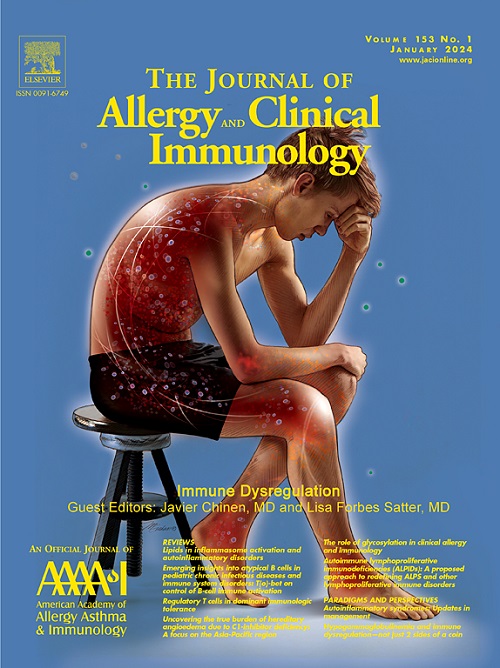Melatonin treatment increases skin microbiota-derived propionic acid to alleviate atopic dermatitis
IF 11.4
1区 医学
Q1 ALLERGY
引用次数: 0
Abstract
Background
Melatonin has been reported to relieve the inflammatory symptoms and improve sleep disturbance in patients with atopic dermatitis (AD). Recent studies showed that melatonin produced beneficial effects by remodeling intestinal microbiota composition; however, whether the beneficial effects of melatonin in AD were mediated by the modulation of skin microbiota remains unclear.
Objective
We sought to investigate the mechanism by which melatonin treatment–induced changes in the skin microbiota composition further alleviated AD.
Methods
The changes in skin bacterial composition after melatonin treatment were detected by 16S-rRNA sequencing. Further mechanisms were explored in calcipotriol (MC903)-induced AD mice and HaCaT cells through skin microbiota transplantation, quantification detection of short-chain fatty acids, transcriptome and single-cell sequencing analysis, quantitative RT-PCR, Western blotting, and Cell Counting Kit-8 assay.
Results
We demonstrated that melatonin reshaped the skin microbiota in AD mice. The transplantation of skin microbiota from melatonin-treated mice alleviated AD symptoms in mice. Skin microbiota–derived short-chain fatty acids, especially propionic acid, were increased in the skin of melatonin-treated AD mice, which further inhibited FABP5 expression to alleviate AD. Propionic acid also inhibited FABP5 expression in HaCaT cells, which was reversed by the treatment of GPR43 inhibitor GLPG0974. GLPG0974 also blocked the therapeutic effects of melatonin on AD mice.
Conclusions
Our study demonstrated that melatonin alleviates AD through the skin microbiota/propionic acid/GPR43/FABP5 axis, highlighting a novel role of melatonin as a modulator of skin microbiota to alleviate AD.

褪黑素治疗可增加皮肤微生物群衍生的丙酸,从而缓解特应性皮炎。
背景:据报道,褪黑素可缓解AD患者的炎症症状并改善睡眠障碍。最近的研究表明,褪黑素通过重塑肠道微生物群组成发挥有益作用;然而,褪黑素对AD的有益作用是否通过调节皮肤微生物群来介导仍不清楚:我们试图研究褪黑素治疗引起的皮肤微生物群组成变化进一步缓解AD的机制:方法:通过16S-rRNA测序检测褪黑素治疗后皮肤细菌组成的变化。通过皮肤微生物群移植实验、短链脂肪酸(SCFAs)定量检测、转录组和单细胞测序分析、逆转录定量 PCR(RT-qPCR)、Western 印迹和 CCK8 检测,进一步探讨了钙泊三醇(MC903)诱导的 AD 小鼠和 HaCaT 细胞的作用机制:结果:我们证明褪黑素重塑了AD小鼠的皮肤微生物群。移植褪黑素治疗小鼠的皮肤微生物群可缓解小鼠的AD症状。经褪黑素治疗的AD小鼠皮肤微生物群衍生的SCFAs增加,尤其是丙酸,这进一步抑制了脂肪酸结合蛋白5(FABP5)的表达,从而缓解了AD症状。丙酸还抑制了 FABP5 在 HaCaT 细胞中的表达,而 G 蛋白偶联受体 43(GPR43)抑制剂 GLPG0974 可以逆转这种抑制作用。此外,GLPG0974还阻断了褪黑激素对AD小鼠的治疗作用:我们的研究表明,褪黑激素可通过皮肤微生物群/丙酸/GPR43/FABP5轴缓解AD,突出了褪黑激素作为皮肤微生物群调节剂在缓解AD方面的新作用。
本文章由计算机程序翻译,如有差异,请以英文原文为准。
求助全文
约1分钟内获得全文
求助全文
来源期刊
CiteScore
25.90
自引率
7.70%
发文量
1302
审稿时长
38 days
期刊介绍:
The Journal of Allergy and Clinical Immunology is a prestigious publication that features groundbreaking research in the fields of Allergy, Asthma, and Immunology. This influential journal publishes high-impact research papers that explore various topics, including asthma, food allergy, allergic rhinitis, atopic dermatitis, primary immune deficiencies, occupational and environmental allergy, and other allergic and immunologic diseases. The articles not only report on clinical trials and mechanistic studies but also provide insights into novel therapies, underlying mechanisms, and important discoveries that contribute to our understanding of these diseases. By sharing this valuable information, the journal aims to enhance the diagnosis and management of patients in the future.

 求助内容:
求助内容: 应助结果提醒方式:
应助结果提醒方式:


